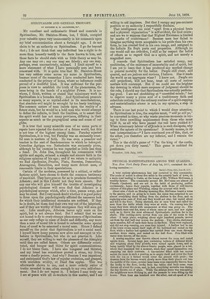Spiritualism and General Thought
My excellent and enthusiastic friend and comrade in Spiritualism, Mr. Stainton-Moses, has, I think, occupied your valuable space very unnecessarily in his comments upon my brief communication about a fortnight ago. I do not claim to be an authority on Spiritualism. I go far beyond that; I do not think that any individual has a right to do more than honestly testify to the facts known to him, and these facts he should state with as little theory as may be. Any one may err; any one may see falsely; any one may, perhaps, even unconsciously, mislead. I limit myself to a mere statement of what I have personally seen and been concerned with. It is quite true that Mr. Stainton-Moses has very seldom come across my name in Spiritualism, because most of the researches I have conducted have been conducted in the privacy of home, where no influences could prevail of a doubtful kind. It was sufficient for the purposes in view to establish the truth of the phenomena, the issue being in the hands of a mightier Power. It is nowhere, I think, written or stated that missionary work in Spiritualism is a bounden duty. And Spiritualism presents so many aspects, is so myriad-sided in its manifestations, that absolute evil might be wrought by too hasty teachings. The common nature of man insists upon the reality of a future state, but he would be a bold man who would attempt to define the infinite, to limit the limitless, or to assert that the spirit world has not many provinces, differing in their aspects as much as the geographical areas and zones of our globe.
It is true that many scientific men of no mean parts or repute have rejected the doctrine of a future world, but this is not true of the highest among them. Faraday rejected Spiritualism, it is true, but Faraday was an eminently trustful man in matters of faith. He was even a preacher and teacher in the sect of Sandemanians to which he belonged. Cornelius Agrippa von Nettesheim was eminently pious, although by his enemies he was regarded as little less than a fiend. Hr. John Dee, throughout his communion with spirits and angels, evinced a simple and sincere faith in the religious opinions of his age; and if we return to antiquity we find Apollonius, Proclus, Plato, Socrates, Democritus, Anaxagoras, Heraclitus, and many more devout men, of reasonable limits in their speculations.
Certain of the moderns, possessed by a critical, or rather factious spirit, have chosen to doubt the common testimony of mankind. They have gone so far as to proclaim themselves Atheists; and in this I doubt not they were sincere. But any one who will give himself the trouble of investigating psychological diseases will soon find that Atheism is a psychological scourge which, after a time, passes away, and may be cured. But I very much doubt whether it is good policy to force upon the psychologically afflicted the nauseous leek for which their intellectual stomachs are unfitted. If they be in doubt, let them find their own way out of the labyrinth, and if they are worthy of their emergence they will soon get out. Like small-pox, Atheism leaves ugly scars on the spirit, but is not always fatal. But I submit that we are not bound to fly to every strange phenomenon of Spiritualism as our only refuge in cases of doubt and difficulty, any more than a man of moral life is bound to subscribe some special form of creed to be esteemed a moral man. Hence I defend myself on the point that Spiritualism is not a social need. I myself know many persons now alive and amongst us who believe in Spiritualism, but who do not practise it. Like myself, they are willing to wait the pleasure of the Almighty until they are called hence. Others are differently constituted, and hunger and thirst for spirit communications, I do not blame them. I have also hungered and thirsted, and my bread has sometimes proved a stone, my living water a deadly poison. And why? Because I was impatient, and anticipated God’s law of regular evolution, and grasped, with mistaken avidity, at Dead Sea apples. This was afterwards shown to me, and a more orderly series of truths revealed to me, often enough to my own self-abasement. But I do not regret it. I believe I may truly say I am at peace with all co-workers in this matter, and I am willing to aid inquirers. But that I occupy any pre-eminent position as an authority I respectfully disclaim.
That intelligence can exist “apart from a physical brain and a physical organisation” is self-evident, for God exists; and are we to suppose that that Highest Existence is limited by marks of contrivance? Because man has failed to imagine anything more acceptable to his pride than his own form, he has created God in his own image, and assigned to the Infinite En Soph parts and properties. Although no one would call me orthodox, I still so far respect the belief of others as to regard God as a spirit, and not merely a magnified man.
I concede that Spiritualism has satisfied many, nay multitudes, of the existence of immortality and of spirit, but I am yet to learn that it has produced any marked change in general morality for the better. People still cheat, and quarrel, and are jealous and envious, I believe. Has it made the world as an aggregate wiser? I know not. People are still prejudiced, will not hear, treat all sorts of serious matters with contempt. But if we could see the brighter day dawning in which mere suspense of judgment should be the rule, I should say that Spiritualism was actually performing good. I am not shuddering at “unsettled minds but to deprive many a pious soul of a traditionary faith and substitute nothing but the ordinary routine of a spirit-rapping and materialisation stance is not, in my opinion, a step in advance.
There is one last point to which I would draw attention, As Spiritualism is true, the sceptics must, “will ye nil lye” be converted in time, so why waste precious moments in trying to force unwilling acquiescence from those who must yield it, as all who have passed the veil have yielded it? When missionary labour of all kinds is in such disrepute, why extend the sphere of its operations? It merely means, in its best interpretation— “I have convinced you of this, that, or the other, you therefore are my inferior, and I remain the victor.”
This is the child’s game of “I’m the king of the castle, get down you dirty rascal.” This game is unfitted for gentlemen.
Hounslow, 13th July, 1878.
Les Theosophes; M-me Blavatsky
...
<... continues on page 7-193 >
Editor's notes
Sources
-
London Spiritualist, No. 308, July 19, 1878, p. 32


